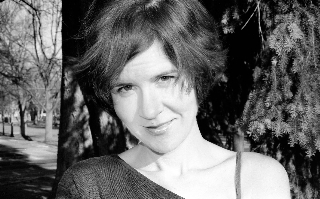I think I know what Dean Young means when he blurbs that Joanna Klink’s second book, Circadian, displays “a Dickinsonian desire for a meeting of minds and a reverence for the natural world.” Klink’s speaker is a rapt solitary, dominated by landscapes that intrude on the senses, who seeks not so much to be understood as not to be misunderstood. But these poems exist as testaments to the virtual impossibility of meetings of minds — and slantingly delight in the pleasures of realizing so while still enjoying some peace and quiet. As for reverence of the natural world, Circadian stripmines whatever it needs from nature in order to make its very human points. Klink is no nature girl. Although there are very few humans in these poems (often just speaker and a vague “you”), nature acts as the scenery of last resort, the same unavoidable, unresponsive environs that maddened Wallace Stevens (in Hartford or Florida), provoking him to champion the imagination in revenge.
March brings the new tide of books in time for April poetry month. The latest group behavior is to leap from public to private and back, add a spasm of chic bitterness, and speak with a stress fracture (or be goofy, be strange). But Klink, single-minded and original, accepts an old-fashioned responsibility: getting at the relationship between reality and the imagination, and creating the sound of its discovery. She begins with an epigraph of three lines from Elizabeth Bishop’s “Cape Breton”: “Whatever the landscape had of meaning appears to have been abandoned, / unless the road is holding it back, in the interior / where we cannot see.” If Klink feels reverence, it’s for the mission of dealing with landscape. The lobby poem, “Auroras,” establishes the rhythm (internal, circadian) of the book: observing or wandering into a natural space, two persons attempt to speak, but are overcome by the sense of what “the road is holding back.” The final seven lines read:
It was enough to hollow us out
The evenings left grasses half-wild at our feet
Branches with spaces for winds
The earth changes
The way we speak to each other has changed
As for a long while we stood in a hall full of exits
Listening for a landscape beyond us
For a book with such a narrow range of situation and tone, Klink manages to keep one expectant and apprehensive. She achieves this not through attitude or inventive detail, but through magnifying the slightest shifts in her repetitive meditations. Her phrasing, syntax and diction all combine, often strangely, to move us into that mental zone where “a landscape beyond us” begins to assemble.
SEA LEVELS
Dividing time equally between earths, there in the coldness
pulling south, flint in the dusk, a few stars.
You are irreducible, there where you stand,
and all the mountains dropping into water.
To what else would you give such care?
Each thing made in the moment we hear.
I understand when the winds rinse ice across the mountains
and the mountains throw out their rock and burden, and the light
and the feel of the light are the beginning of what we know.
How close can you come?
Come into the world again.
Birds are moving through the sky, a few
below roof-level, rising where there are breezes.
One night and division sets in, two and we wonder
what pardon, three and you are sleeping poorly.
Simplicity remembering there never was a time.
There never was a time a time before spacious disquiet.
There never was a below-sea-level where the bird
flew warmly in water. There never were stars
shaking on the surface or stars sinking.
The fish dream as the stars fall past them.
The bird seeks a place to land and cannot, in the swell of tides,
in the shallow sandstops, find it. All freedoms
drawing us forth. The flocks of geese
swim in the sand-flecked night, and bring stories of arrival.
 This is the voice of a teacher and prophet, elevated within the severe limitations and burdens of “spacious disquiet,” a quality shared with earths, coldness, water, sand, wind, light, tides. There’s a copious amount of wind and light in the poems and a scarcity of depicted human interaction – but these speeches are assertive communications from someone who is also “irreducible.” There’s a throwing off of psychological analysis, replaced by gnostic affirmation. The instructor leads, asking the reader to finish the thought: “Simplicity remembering there never was a time.” And then completing it with the audience, the inductee. The rhythm of argument is made obvious, but not the sense (which must be as difficult to grasp as the sensation of otherness, the fact in the poem): description as fragment, question, quasi-answer. How close can we come? Come and see. The bird doesn’t land. There are also seeming contradictions: there never were “stars sinking,” and then “The fish dream as the stars fall past them.” How very strange to sense that these apparent oppositions are resolving in some other part of the brain.
This is the voice of a teacher and prophet, elevated within the severe limitations and burdens of “spacious disquiet,” a quality shared with earths, coldness, water, sand, wind, light, tides. There’s a copious amount of wind and light in the poems and a scarcity of depicted human interaction – but these speeches are assertive communications from someone who is also “irreducible.” There’s a throwing off of psychological analysis, replaced by gnostic affirmation. The instructor leads, asking the reader to finish the thought: “Simplicity remembering there never was a time.” And then completing it with the audience, the inductee. The rhythm of argument is made obvious, but not the sense (which must be as difficult to grasp as the sensation of otherness, the fact in the poem): description as fragment, question, quasi-answer. How close can we come? Come and see. The bird doesn’t land. There are also seeming contradictions: there never were “stars sinking,” and then “The fish dream as the stars fall past them.” How very strange to sense that these apparent oppositions are resolving in some other part of the brain.
In “And Having Lost Track,” the now familiar pattern recurs. Klink begins, “And having lost track, I walked / toward the open field. Now transparent, / now far, the day-moon burned through the waste / air.” The request is to entertain a disorientation among basic earthly attributes in order to arrive at – what? These are the poem’s final lines:
To be outside the classifiable world,
and having lost track, and having heard
no message. As when a single existence
vanishes and the flute does not warp,
or sounds like the inside of a shell,
and the word for shell means
too many things. As if this were the last
mile, a path fashioned with white roses.
And chose the science of extraction,
the science of snow.
And walked in the dark world,
everywhere shaking with light.
That we only exist. That we do not
have the means. And are free to take place.
 Another reason why Klink’s poetry performs perfectly toward its goal is that it is completely given up to itself. In other words, the obsessive tone of orphic perspicacity starts with the first word. As it is, even with this tone in place, the ending is a bit too dogged, but she gets away with it. If she had begun the poem in the voice of someone less unhinged (thus, inside the classifiable world) and tried to pass off the final lines as they now stand, we would reject the whole. This is the kind of poetry that can pull off a line like “And chose the science of extraction” without the poet’s editor scribbling in the margin of the manuscript, “Too vague, adds nothing, cut it.” Or perhaps he/she scribbles it, but then relents.
Another reason why Klink’s poetry performs perfectly toward its goal is that it is completely given up to itself. In other words, the obsessive tone of orphic perspicacity starts with the first word. As it is, even with this tone in place, the ending is a bit too dogged, but she gets away with it. If she had begun the poem in the voice of someone less unhinged (thus, inside the classifiable world) and tried to pass off the final lines as they now stand, we would reject the whole. This is the kind of poetry that can pull off a line like “And chose the science of extraction” without the poet’s editor scribbling in the margin of the manuscript, “Too vague, adds nothing, cut it.” Or perhaps he/she scribbles it, but then relents.
“Blue Ice” begins, “And though we may know nothing of each other, / we have to do with one another, also the dark washing // quiet of certain tides.” Dealing with you is like dealing with the meaningless rhythm of tidal wash. At the core of things, and displayed on the surfaces as well, is an uncomforting essence. She continues, “I would find all the names for blue and banish / each etcetera, undertaking to live where the world // richly dissolves in its departures …” The tense is conditional, signaling her current condition: too much stasis and taking-for-granted. The repetitions of Circadian are the proof of a passionate unachievement. There is no permanent transformation of the person, only moments of insight. The poem ends, “and everything we thought we were, wandering // a long time through our lives, might count, might help / guide us – since we have not been spared.” We actually live like “the new grasses on the beaches, the plusher greens they portend.” Philosophies, politics and priests can’t spare anyone from what “pods ripped from the shaking milkweed stalks” seem to suggest. I intentionally disregarded Klink’s two pages of endnotes while reading, but I see now that a line by Martin Buber from Pointing the Way informs “Blue Ice”: “Those who stand on the crossfront, those who know nothing of one another, have to do with one another.” Setting off again and again from a single point of departure, Klink draws selectively from those who have successfully managed the round-trips: Creeley, Eiseley, Thoreau, Linda Gregg, Rilke, Celan, Shakespeare, Char, Marianne Wiggins.
In the following poem, Klink shows an affinity for both Stevens’ “mind of winter” and Frost’s pausing to watch the woods fill up with snow.
WINTER FIELD
What better witness than this evening snow,
its steady blind quiet, its eventual
completeness, a talc smoothing every surface
through the lumen tricks of ice.
No one who comes here hastens to leave,
though the mineral winter makes a dull
math of cold inside the bones, a numbness
thinning into each fingertip and eye.
Faint injury traveling toward earth
in shifting silence, a softness in the weather
passing through us, dark moods of snows –
a sense of peace so deep we extend out
into the blackness of our lives, dread and failure,
and feel no hint of terror, only the premonition
of drift-design, the stars behind the snow
burning in ancient immanence over the field.
What lights a world gone blank with despair?
You were here once; you will be here again.
The enveloping sounds, the quality of light: something passes through us, “premonition / of drift-design.” Klink unabashedly can say “ancient immanence” and “blackness of our lives” and “a sense of peace so deep” without sounding at all precious. Although she maps out an agenda for us among her landscapes, Klink is utterly loyal to the freedom she would have us enjoy. This fidelity is what I hear in the skillfully handled, resonant final lines of “Winter Field.”
This is one of those rare instances when I have to agree with the blurber’s use of superlatives. Joanna Klink’s Circadian is remarkable.
[Published by Penguin Books on July 31, 2007, 80 pp., $16.00 paper]